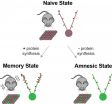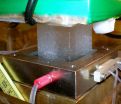(Press-News.org) CAMBRIDGE, MA -- Memories that have been "lost" as a result of amnesia can be recalled by activating brain cells with light.
In a paper published today in the journal Science, researchers at MIT reveal that they were able to reactivate memories that could not otherwise be retrieved, using a technology known as optogenetics.
The finding answers a fiercely debated question in neuroscience as to the nature of amnesia, according to Susumu Tonegawa, the Picower Professor in MIT's Department of Biology and director of the RIKEN-MIT Center at the Picower Institute for Learning and Memory, who directed the research by lead authors Tomas Ryan, Dheeraj Roy, and Michelle Pignatelli.
Neuroscience researchers have for many years debated whether retrograde amnesia -- which follows traumatic injury, stress, or diseases such as Alzheimer's -- is caused by damage to specific brain cells, meaning a memory cannot be stored, or if access to that memory is somehow blocked, preventing its recall.
"The majority of researchers have favored the storage theory, but we have shown in this paper that this majority theory is probably wrong," Tonegawa says. "Amnesia is a problem of retrieval impairment."
Memory researchers have previously speculated that somewhere in the brain network is a population of neurons that are activated during the process of acquiring a memory, causing enduring physical or chemical changes.
If these groups of neurons are subsequently reactivated by a trigger such as a particular sight or smell, for example, the entire memory is recalled. These neurons are known as "memory engram cells."
Shedding light
In 2012 Tonegawa's group used optogenetics -- in which proteins are added to neurons to allow them to be activated with light -- to demonstrate for the first time that such a population of neurons does indeed exist in an area of the brain called the hippocampus.
However, until now no one has been able to show that these groups of neurons do undergo enduring chemical changes, in a process known as memory consolidation. One such change, known as "long-term potentiation" (LTP), involves the strengthening of synapses, the structures that allow groups of neurons to send signals to each other, as a result of learning and experience.
To find out if these chemical changes do indeed take place, the researchers first identified a group of engram cells in the hippocampus that, when activated using optogenetic tools, were able to express a memory.
When they then recorded the activity of this particular group of cells, they found that the synapses connecting them had been strengthened. "We were able to demonstrate for the first time that these specific cells -- a small group of cells in the hippocampus -- had undergone this augmentation of synaptic strength," Tonegawa says.
The researchers then attempted to discover what happens to memories without this consolidation process. By administering a compound called anisomycin, which blocks protein synthesis within neurons, immediately after mice had formed a new memory, the researchers were able to prevent the synapses from strengthening.
When they returned one day later and attempted to reactivate the memory using an emotional trigger, they could find no trace of it. "So even though the engram cells are there, without protein synthesis those cell synapses are not strengthened, and the memory is lost," Tonegawa says.
But startlingly, when the researchers then reactivated the protein synthesis-blocked engram cells using optogenetic tools, they found that the mice exhibited all the signs of recalling the memory in full.
"If you test memory recall with natural recall triggers in an anisomycin-treated animal, it will be amnesiac, you cannot induce memory recall," Tonegawa says. "But if you go directly to the putative engram-bearing cells and activate them with light, you can restore the memory, despite the fact that there has been no LTP."
"Groundbreaking paper"
Further studies carried out by Tonegawa's group demonstrated that memories are stored not in synapses strengthened by protein synthesis in individual engram cells, but in a circuit, or "pathway" of multiple groups of engram cells and the connections between them.
"We are proposing a new concept, in which there is an engram cell ensemble pathway, or circuit, for each memory," he says. "This circuit encompasses multiple brain areas and the engram cell ensembles in these areas are connected specifically for a particular memory."
The research dissociates the mechanisms used in memory storage from those of memory retrieval, according to Ryan. "The strengthening of engram synapses is crucial for the brain's ability to access or retrieve those specific memories, while the connectivity pathways between engram cells allows the encoding and storage of the memory information itself," he says.
INFORMATION:
This news release is available in Japanese.
Long-held social biases can be reduced during sleep, a new report suggests. It adds further support to recent research that has shown that memories can be selectively reactivated and strengthened during slumber. Scientists have known that sleep boosts memory formation by resuscitating faint neuron activity shaped during earlier periods, when an individual was awake. This process can be experimentally stimulated by giving a sleeping individual cues related to an earlier period of learning. Now, Xiaoqing Hu and colleagues ...
This news release is available in Japanese. Xiaochun Qin and colleagues have provided a high-resolution crystal structure of a plant protein supercomplex critical to photosynthesis, shedding new light on how this extremely effective solar energy converter achieves its impressive performance. The photosynthesis of many plants relies upon the large light-harvesting complex I (LHC1), which surrounds photosystem I (PSI) and captures sunlight. LHC1 is able to transfer the energy it absorbs to the PSI core, where it is converted into chemical energy with close to 100% efficiency. ...
This news release is available in Japanese.
Memories that have been destabilized and forgotten by mice can nevertheless be retrieved by activating memory engrams, or specific patterns of neurons that fire when memories are encoded, with light, researchers say. These findings provide fresh insight into memory consolidation, or the process by which new, unstable memories transform into stable, long-term memories. Until now, researchers have wondered whether memory consolidation was dependent upon the stabilization of these memory engrams. But Tomás Ryan and colleagues ...
This news release is available in Japanese.
Armadas of icebergs that broke off the Greenland ice sheet into the northern Atlantic Ocean during the Last Glacial Period -- between about 110,000 and 12,000 years ago -- often increased methane production in the tropics, according to a new study. These findings illustrate how high-latitude events can influence tropical climate conditions, and they hint at the underlying mechanisms of abrupt climate changes. Such massive discharges of icebergs into the Atlantic are known as Heinrich Events, and researchers have wondered for ...
CHICAGO --- HIV has a voracious sweet tooth, which turns out to be its Achilles' heel, reports a new study from Northwestern Medicine and Vanderbilt University.
After the virus invades an activated immune cell, it craves sugar and nutrients from the cell to replicate and fuel its wild growth throughout the body.
Scientists discovered the switch that turns on the immune cell's abundant sugar and nutrient pipeline. Then they blocked the switch with an experimental compound, shutting down the pipeline, and, thereby, starving HIV to death. The virus was unable to replicate ...
Zoonotic malaria has been shown to be caused by two genetically distinct Plasmodium knowlesi parasite subpopulations associated with different monkey host species in Malaysia, according to new research published in PLOS Pathogens. The authors believe this could have important implications for how the parasite adapts and spreads in humans.
Plasmodium knowlesi is a zoonotic malaria parasite which is common in forest-dwelling macaques. In recent years, increasing numbers of cases of knowlesi malaria have been reported in humans. The disease is now the most common form of ...
Different people can vary substantially in their genetic susceptibility to viruses, including HIV. Although the biology that underlies this variation in humans is still being uncovered, it seems that we may be able to learn some key lessons from our closest cousins. A gene variant in chimpanzees in a Tanzanian wildlife preserve probably protects them from rapidly succumbing to the primate equivalent of HIV, Stanford University School of Medicine scientists report in the open access journal PLOS Biology, publishing May 28.
The wild chimps inhabit Gombe Stream National ...
EVANSTON, Ill. --- Can we learn to rid ourselves of our implicit biases regarding race and gender? A new Northwestern University study indicates that sleep may hold an important key to success in such efforts.
Building on prior research, the Northwestern investigators aimed to find out whether learning to alter habitual reactions to other people could be enhanced during sleep.
Other researchers have documented many unsavory consequences of common social biases. When playing a videogame with instructions to shoot only people carrying weapons, players were more likely ...
CORVALLIS, Ore. - A new study shows how huge influxes of fresh water into the North Atlantic Ocean from icebergs calving off North America during the last ice age had an unexpected effect - they increased the production of methane in the tropical wetlands.
Usually increases in methane levels are linked to warming in the Northern Hemisphere, but scientists who are publishing their findings this week in the journal Science have identified rapid increases in methane during particularly cold intervals.
These findings are important, researchers say, because they identify ...
TAMPA, Fla. - Advanced non-small cell lung cancer (NSCLC) patients have few effective treatment options and low 5-year survival rates. The checkpoint inhibitors MEDI4736 and tremelimumab have both demonstrated acceptable safety and potential efficacy when used as single-agents in several different types of cancer. Scott J. Antonia, M.D., Ph.D., chair of the Thoracic Oncology Department at Moffitt Cancer Center will be presenting data from a phase 1b dose-escalation and expansion study of MEDI4736 combined with tremelimumab at the 2015 American Society of Clinical Oncology ...


